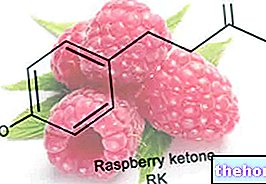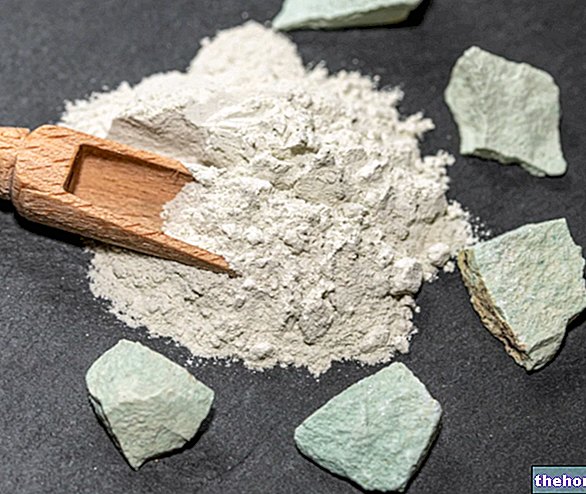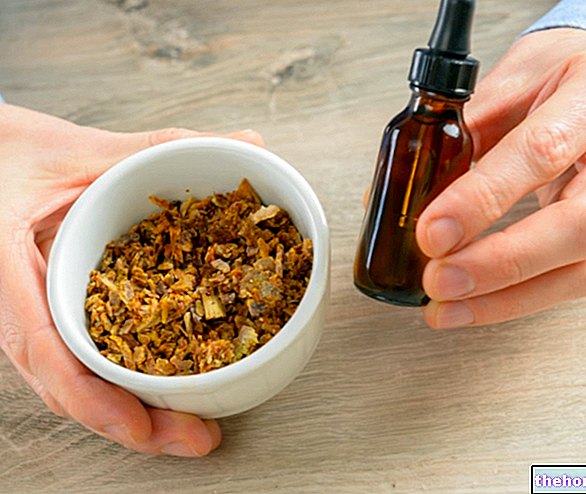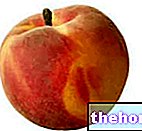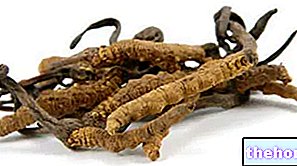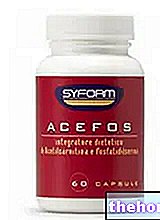In this article we deal with the most effective herbs for weight loss, generally safe natural aids to be combined with adequate dietary-behavioral interventions (see table).

See also:
- supplements for weight loss
- sport to lose weight
- water for weight loss
- "secrets" to lose weight
- infusion for weight loss
The categories of "herbs" useful for weight loss are essentially four: that of diuretic drugs, that of stimulating drugs, that of drugs rich in fiber and mucilage, and that of drugs that accelerate metabolism. Other natural products potentially useful for weight loss, but not listed in this article, are chitosan (reduces fat absorption), garcinia cambogia (fruit pericarp - reduces the synthesis of fatty acids and increases the sense of satiety), banaba and gymnema (leaves - hypoglycemic properties).
Diuretics / draining
Which drugs: Asparagus (rhizome, roots), Birch (leaves), cherry (fruit peduncles), horsetail (aerial parts), ash (leaves and seeds), weed (rhizome), corn (stigmas or "corn barbs"), meadowsweet (flowers), orthosiphon (leaves), spiny restharrow, (root), nettle (flowering plant, roots), pilosella (aerial parts), parsley (parts, areas, roots), butcher's broom or butcher's broom (rhizome), dandelion (root) golden rod (flowering tops).
Why: Although diuretics can induce significant weight loss, they are not considered real weight loss remedies. The kg lost are in fact represented by liquids and not by fat; despite this, the use of these herbs can help to purify the body from excess toxins. Many of these harmful substances, in fact, are accumulated in the adipose tissue and released into the circulation during weight loss. The diuretic effect is particularly useful also for those people who suffer from cellulite and slight venous insufficiency, with a tendency to the formation of edema in the lower limbs.
How and when: to avoid drastic effects, and their dangerous consequences, we recommend the use of draining herbal teas, which, among other things, provide liquids and minerals at the same time. short periods to the extent of two or three cups a day.
Stimulants
Which drugs: bitter orange (unripe fruit), cocoa, coffee (seeds), capsaicin, guarana (seeds), maté (leaves), ephedra (aerial parts), black tea (leaves), green tea (leaves), yohimbe (bark of the stem).
Why: this category of natural remedies is well known in the sports sector, where its stimulating and slimming effects are appreciated. Often used in combination with each other (in so-called stacks), these drugs produce exciting, anorectic (reduction of hunger) and tonic effects, with increased thermogenesis and metabolism.
How and when: excessive use of these herbs for weight loss is accompanied by well-known and dangerous adverse effects, psychic (agitation, nervousness, anxiety, insomnia) and cardiovascular (palpitations, tachycardia and hypertension). Furthermore, their slimming effect tends to diminish over time due to the phenomenon of addiction. For all these reasons, it is advisable not to prolong the intake beyond 4-5 weeks, without exceeding the recommended doses. These slimming herbs are generally contraindicated for those suffering from hypertension, diabetes, peptic ulcers and cardiovascular disorders in general.
Fiber and mucilage supplements
Which drugs: bran; guar and guar gum; karaya gum; psyllium, psyllium seeds; agar agar; glucomannan; pectin; Konjac flour; algin and alginic acid; carrageenan.
Why: they increase the sense of satiety and reduce and slow down the absorption of nutrients; by helping to keep blood sugar stable, they avoid hyperphagic crises resulting from episodes of reactive hypoglycemia. Remember that the massive intake of bran for therapeutic purposes significantly reduces the " intestinal absorption of calcium, zinc, magnesium and phosphorus, all essential elements for the organism, especially during growth, in the elderly, in debilitated subjects and in pregnant women. In this case, it is essential to supplement the diet with vitamin and mineral supplements.
How and when: give preference to fibers naturally contained in food; these natural weight loss remedies are generally taken 20-30 minutes before a meal, along with copious amounts of water. Fiber supplements, especially if in tablets, should not be taken before bedtime, as, by swelling quickly, they could cause esophageal obstructions with consequent nocturnal asphyxia. In general, its use is not recommended in the presence of intestinal obstructions or inflammations, pyloric stenosis, megacolon or megaretto, marked meteorism and in functional dyspepsia.
Metabolism-accelerating plants
Which drugs: sea oak (fucus) and other algae.
Why: seaweeds are a generous source of iodine, essential for the synthesis of thyroid hormones, which in turn are crucial for supporting the body's metabolism; they are also rich in vitamins, minerals and fibers, which increase the sense of satiety and reduce and slow down the absorption of nutrients.
How and when: overdosing can cause hyperthyroidism, thyroid dysfunction, tremors, irritability, hot flashes, tachycardia, insomnia and arterial hypertension. any slimming herb.
Select plant Fir Acacia Acerola Sorrel Yarrow Yarrow Yarrow Aconito Adatoda Garlic Agnocasto Agrimonia Alchemilla Alkekengi Aloe Altea Witch Hazel Ammi or Visnaga Pineapple Andrographis Anemone Pulsatilla Angelica Anise Star Anise Japanese Star Anise Bitter Orange Bitter Areca Arnica Harpagophytum Arpagophyte Artemisia Asteragus Basil Asparagus Asparagus Peruvian Asparagus Asparagus Asparagus Hawthorn Boldo Borage Shepherd's Purse Boswellia Bucco Butea superba Cocoa Coffee Cajeput Calamus Calamus Marigold Camedrio Chamomile Roman Chamomile Camphor Cinnamon Ceylon Maidenhair Capuchin Artichoke Cardamom Cardiac Thistle Asian Thistle Carvi Cascara Cassia Catecu Catha Cabbage Celandine Chicory Centaurea Cinnamon Cypress Celandine Chives Cypress Coca Cola Colchico Combreto Condurango Comfrey Coriander Cranberry Barberry American Chrysanthemum Cumin Turmeric Damiana Digital Dioscorea Drosera Dulcamara Dunalilella Echinacea Eder a Ephedra Elenio Eleutherococcus Helichrysum Evening primrose Horsetail Alfalfa Erica Euphrasia Erisimo Escolzia Eucalyptus Farfara Farfaraccio Calabar bean Fenugreek Fennel Phytolacca Frangola Ash Fumaria Japanese Mushrooms Galega Ganoderma lucidum Garcinia Cambogia Mulberry Gentian Broom Ginkgo Ginkgo Guipana Guipana Gynestra Ginkgo Hibelia Gymnasium Hibiscus Guarulp St. John's Wort Horse Chestnut Ispaghul Hyssop Jaborandi Kava kava Konjac Laminaria Cherry Laurel Lavender Lemongrass Lespedeza Lovage Icelandic Lichen Lemon Flax Lippia Licorice Lobelia Hops Maca Marjoram Maize Mallow Manna Marrubio Marrubio d "water Matè Melaleuca Meliloto American Lemon balm Myrtle Myrama Walnut Nutmeg Walnut vomica Olive tree Meadowsweet Ononide Opuntia Oregano Orthosiphon Nettle Poppy Papaya Parietaria Feverfew Passiflora Chilli Perilla Periwinkle Phyllanthus Plantain Picrorhiza Pilosella Pino Pisci dia Podofillo Polygala Grapefruit Parsley Psyllium Pueraria mirifica Butcher's broom Pygeum Quassia Oak Rhubarb Ratania Rauwolfia currant Castor bean Rhodiola Rosehip Rosemary Rue Willow Sarsaparilla Sage Elderberry Sassafras Sedum Ergot Senna Serenoa Repens Soybean Solidago Tansy Taraxus Tamarind Tamarind Tamarind Tamarind Tamarindo Ursina Valerian Vanilla Mullein Verbena Veronica Viburnum Vinca Pansy Mistletoe Vine Withania Yohimbe Saffron Ginger Pumpkin Select disease Juvenile Acne Rosacea Tinnitus Tinnitus Aerophagia Tendon Affections Afonia Aphthae Algias Functional Halitosis Breastfeeding Allergy Anemia Anguish Anxiety Arteriosclerosis Asthrosis Asthrosis Arthritis Arthritis Men Sex Woman Blepharitis and Conjunctivitis Eye bags Bronchitis Gallstones Kidney stones Salivary stones Baldness Androgenetic Candida Fragile hair Caries Headache Cellulitis Motion sickness Cystitis C limaterio Cholecystopathy High cholesterol Ulcerative colitis Colonoscopy Contusions Hematoma Convalescence Couperose Depression Dermatitis Diaper dermatitis Diabetes Diarrhea Erectile dysfunction Dyslipidemia Dysmenorrhea Dyspepsia Disturbances of vision Hemorrhoids Epistaxis Herethism Heart disease Fever Fibromyalgia Gastro-intestinal disease Flatulence Hypertension Fibromyalgia Gastrointomnia Jaundice Laryngitis Renal lithiasis Toothache Sore throat Thinness Menopause Meteorism Mononucleosis Alzheimer's disease Crohn's disease Nausea Vomiting Obesity Dark circles Onychomycosis Osteoporosis Dry skin Periarthritis Piorea Low pressure Prostatitis Psoriasis Colds Breast fissures Anal fissures Gastro-nasal rhinitis Senescence Premenstrual Syndrome Sinusitis Quit smoking Overweight Fatty liver Constipation Stomatitis Stress Cough Triglycerides high Ulcer Burns Nails Brittle flashes Heat Warts Dizziness Properties herbal Tanning Abortive adaptogenic Aphrodisiac bittering analgesic anesthetic anorectics analgesic antacid anti-allergic anti-asthmatic Antibiotic catarrh Anticellulitiche anticonvulsant Antidiaforetiche antidiarrheal edematous anthelmintic antiemetic Antiemorroidarie antiphlogistic Antiidrotiche Antinevrotiche Antioxidants antipyretic antirheumatic antiscorbutic Antiseptic antispasmodic anti-uric Aperitive Flavoring Astringent Balsamic Bechiche Capillarotrope Cardiotonic Carminative Cathartic Caustics Healing Cholagogues Choleretic Dyes Decongestants Deodorants Purifying Diaphoretic Cleansers Disinfectants Detoxifiers Thirst quenching Diuretics Exciting Emetics Emmenagogues Emollients Hemostatic Energies Hepatoprotectors Expectorants Eupepticus Moisturisers Galactosensitizers lanti Hypertensive Hypnotic Hypoglycemic Hypotensive Irritants Laxatives Soothing Narcotic Nerves Nutrients Odontalgic Pectoral Purgative Revulsive Remineralizing Refreshing Rubefacient Scialagoghe Sedative Soporifugas Sneezing Stomachic Stomatics Narcotic Vascular Tightenitis

